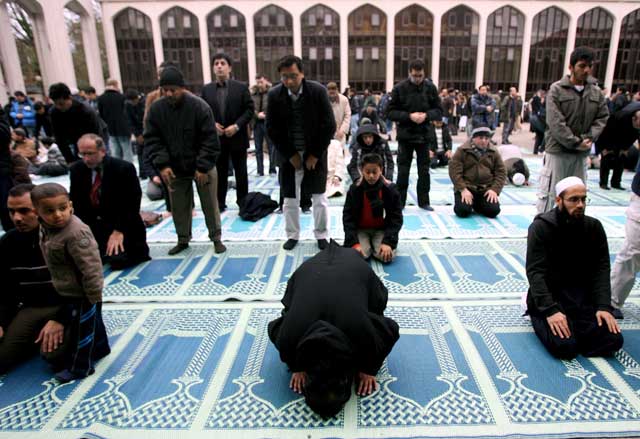Reading the Qur'an, By Ziauddin Sardar

What I noticed first about this book were the people whose endorsements fill the back cover. Ziauddin Sardar's Reading the Qur'an is a fairly robust looking hardback and comes with overly glowing comments from two well-known Islam scholars from the US and the ubiquitious Karen Armstrong. The book seemingly promises much at a scholarly level but, on the first page, Sardar tells the reader that the work grew out of his 'blogging the Qur'an project' for the Guardian newspaper. Thus the style of the book is discursive and conversational, inviting the reader to walk and talk with Sardar on his personal journey through the Qur'an, an exploration of how the text speaks to him. As Sardar himself say, "I write as Every Muslim; as an individual trying to understand what the Qur'an means to me in the twenty-first century."
The book is divided into four parts. The first is an overview in which Sardar provides an autobiographical note of his Islamic upbringing and learning to read the Qur'an. Many Pakistani Muslims of a certain generation will recognise themselves in his words. The second part looks at diverse themes such as Fall and Evil, Marriage and Divorce, Arguing with God. Sardar opens each section by quoting selections from the first two chapters of the Qur'an. In part three, Sardar aims to reconnect more timeless themes such as community and prophecy to contemporary times by looking at the Qur'an as a whole. In the final part, "Contemporary Topics", he looks at a wide range of more controversial topics including the Veil, Homosexuality, Assisted Suicide and Evolution.
The sections are fairly short and reflect a varied stylistic mix of the personal, the anecdotal, the occasional musing on the philosophical, and the simply descriptive. What ties them all together is Sardar's basic contention: Muslims must liberate themselves from the age-old interpretations, the legacy of classical Islamic thought, and stop living in the past. No interpretation of the Qur'an is absolute and every age demands a contextualised reading for its message to be of eternal relevance and meaning.
Most liberal-minded Muslims, lay or scholarly, will probably agree with Sardar on his intentions here to find a more inclusive, moral and pluralistic meaning in the Qur'an. But this is not the first time such things have been said either in contemporary or pre-modern times; Sardar is wrong to assume that his approach, stressing the historical context, makes "his reading different from others".
Furthermore, in reading the Qur'an without the "weight of the tradition" where "great jurists supposedly gave unalterable opinions and interpretations", Sardar misunderstands the purpose of much of the Muslim intellectual tradition. The writings of jurists within their own scholarly traditions were always tentative, discursive, allowing for debate and human vulnerability. The jurist's aim was not to lay down the law definitely, nor was Islamic law ever considered unalterable; this perspective is unfortunately a more modern phenomenon.
The insistence on individual engagement which Sardar advocates may sound laudable but also runs the risk of even more fundamentalist and extreme interpretations of the Qur'an. It is unfortunate that in the public domain, Islam is debated more as an ideology than a faith belonging to millions. But what is even more unfortunate is that the debates around Muslims in the west, and in the UK in particular, belong to one of two reductive categories - a political correctness around Islam which causes constant resentment within much of the British public, and the emotive outcries of "Islamophobia" by some Muslims which stifle any serious attempt to have more reasoned debates.
In this context, Sardar's book will appeal to a certain intelligentsia mindful that more Muslims should write with similar compassion, but it then begs the question – who is this book for? The Muslims who believe in the software of democracy, like pluralism and sexual equality, already think like Sardar; this book will teach them nothing new. The Muslims who disagree with Sardar will accuse him of a certain sentimentality, even arrogance, in that he sees his interpretation as more in line with Qur'anic ethical teaching, the more correct interpretation. Sardar may not be saying this himself but it is implicit.
The strength of this book is that it is accessible to a wide audience; its weakness is that it also tries to maintain a scholarly undertone where the conclusions often sound a little hackneyed. For example, in the section on witness, Sardar tries to explain the issue of two female witnesses being the equivalent of one male witness from the Qur'an's social perspective, but ends up concluding that classical commentators were often misogynists and the Muslim world needs female scholarly voices. How many times has this been said before? In his section on homosexuality, Sardar tries to be sensitive to the various debates but ends up dismissing many of the prophetic utterances traditionally thought to be pertaining to homosexuality as "fabricated" and "not authentic". Why are only the less pleasant hadiths judged to be fabricated?
When talking about assisted suicide, Sardar emphasises the sanctity of life. Thus, he also mentions his abhorrence at "suicide bombers" who kill innocent civilians out of their love for Islam. I don't disagree with Sardar, but not because he has convinced me through scholarly or personal argument. The book makes all the right noises about the kind of Islam many would like to see today, but his critics will see little else than personal musings on the lowly state of Muslim communities. I would hope that Sardar is capable of more than that.
Mona Siddiqui is Professor of Islamic Studies at Glasgow University
Join our commenting forum
Join thought-provoking conversations, follow other Independent readers and see their replies
Comments
Bookmark popover
Removed from bookmarks